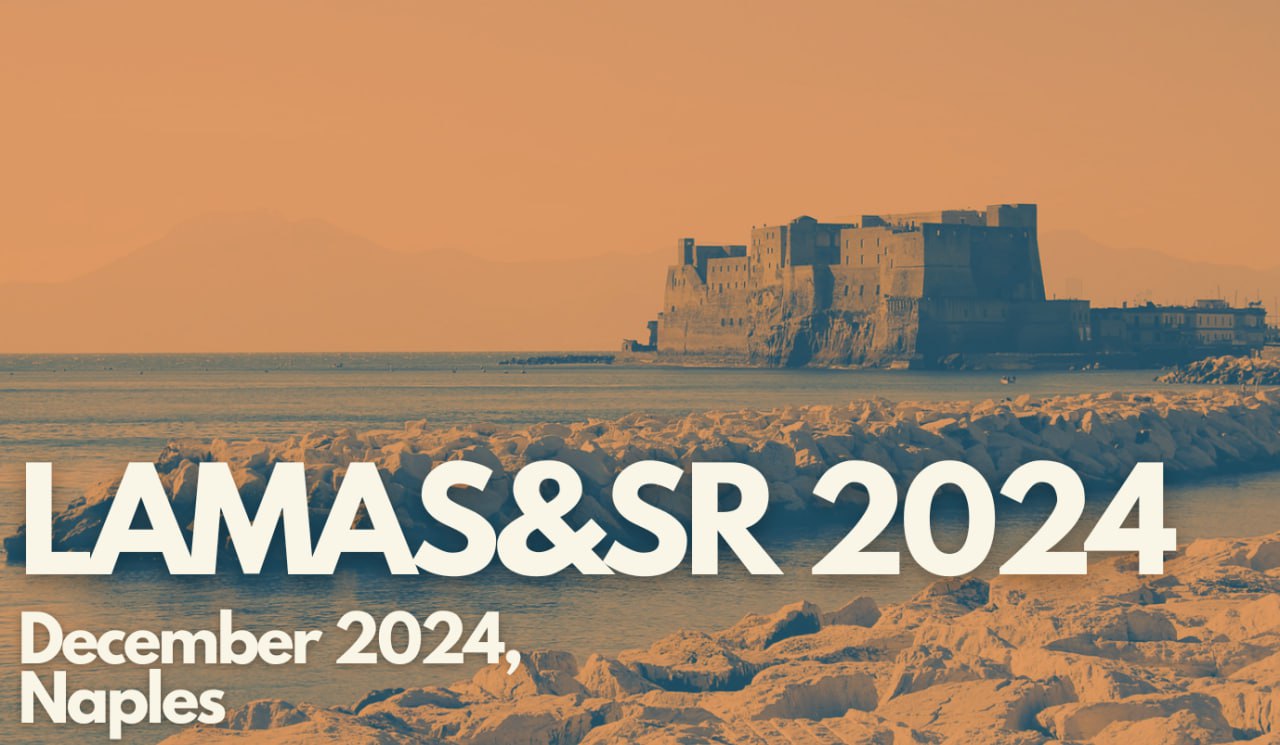

Logics and strategic reasoning play a central role in multi-agent systems. Logics can be used, for instance, to express the agents' abilities, knowledge, and objectives. Strategic reasoning refers to algorithmic methods that allow for developing good behaviour for the agents of the system. At the intersection, we find logics that can express the existence of strategies or equilibria, and can be used to reason about them. The LAMAS&SR workshop merges two international workshops: LAMAS (Logical Aspects of Multi-Agent Systems), which focuses on all kinds of logical aspects of multi-agent systems from the perspectives of artificial intelligence, computer science, and game theory, and SR (Strategic Reasoning), devoted to all aspects of strategic reasoning in formal methods and AI.
LAMAS - The LAMAS workshop provides a meeting forum for the research community working on various logical aspects of multi-agent systems (MAS) from the perspectives of artificial intelligence, computer science, and game theory. It addresses the whole range of issues that arise in the context of using logic in MAS, from theoretical foundations to algorithmic methods and implemented tools. The workshop LAMAS has been regularly organised since 2002 and became the main annual event of the LAMAS research network.
SR - Strategic reasoning is a key topic in the multi-agent systems research area. The extensive literature in this field includes a number of logics used for reasoning about the strategic abilities of the agents in the system, but spans also game theory, decision theory or epistemic logics to name a few. The aim is to provide sound theoretical foundations and tools to tackle a variety of strategic problems in formal methods and artificial intelligence involving agents in adversarial settings. The SR workshop has been organised annually since 2013, often in co-location with the most important conferences in formal methods and AI.
LAMAS&SR - Over the years the communities and research themes of both workshops got closer and closer, with a significant overlap in the participants and organisers of both events. For this reason, the next editions of LAMAS and SR will be unified under the same flag, formally joining the two communities.
LAMAS&SR is interested in all topics related to logics and strategic reasoning in multi-agent systems, from theoretical foundations to algorithmic methods and implemented tools. The topics of the workshop include, but are not limited to:
Authors are invited to submit extended abstracts of up to 4 pages plus 1 page for references only, in the format of the KR 2024 conference (KR24_authors_kit.zip). Both published and unpublished works are welcome. Submissions are subject to a single-blind review process (submissions should not be anonymous). Submissions must be a single PDF file and will be handled via CMT, using the following button:
The workshop will be ONLINE and participation is free.
Please, register at the following link: Registration Form
Although there will be no formal proceedings, accepted extended abstracts will be made available on the workshop website. Extended and revised versions of the best papers presented at the workshop will be invited for a special issue of a leading journal.
| Time [GMT+1] | Event |
|---|---|
| 09:50 - 10:00 | Welcome |
| 10:00 - 11:00 |
Invited Talk: Complexity Measures for Reactive Systems, Orna Kupferman
Abstract: A reactive system maintains an on-going interaction with its environment. The system is correct with respect to a given specification if, for all environments, the infinite computation that is generated by the interaction between the system and the environment satisfies the specification. Reactive systems are modeled by transducers: finite state machines whose transitions are labeled by assignments to the input signals and whose states are labeled by assignments to the output signals. In the synthesis problem, we automatically transform a given specification into a correct transducer.
While complexity measures receive much attention in the design of algorithms, they are less explored in the context of synthesis. This is a serious drawback: just as we cannot imagine an algorithm designer that accepts a correct algorithm without checking its complexity, we cannot expect designers of reactive systems to accept synthesized systems that are only guaranteed to be correct. One immediate complexity measure for a transducer is its size, but many more complexity measures are of interest. The talk discusses such measures and describes how the search for optimal reactive systems affects the synthesis problem.
|
| 11:00 - 11:20 | Intuitionistic modal logics: reasoning about distributed knowledge, Philippe Balbiani |
| 11:20 - 11:40 | Dynamic Coalition Logic over Neighborhood Semantics, Shuliang Dong |
| 11:40 - 12:00 | Globally Rigid Awareness Logic with Static Abstraction Operators, Kosuke Udatsu |
| 12:00 - 12:20 | Arena-Independent Memory Bounds for Nash Equilibria in Reachability Games, James Main |
| 12:20 - 14:00 | Lunch Break |
| 14:00 - 15:00 |
Invited Talk: Computationally Feasible Strategies, Catalin Dima
Abstract: Real-life agents seldom have unlimited reasoning power. In this talk, we propose and study a new formal notion of computationally bounded strategic ability in multi-agent systems. The notion characterizes the ability of a set of agents to synthesize an executable strategy in the form of a Turing machine within a given complexity class, that ensures the satisfaction of a temporal objective in a parameterized game arena. We show that the new concept induces a proper hierarchy of strategic abilities - in particular, polynomial-time abilities are strictly weaker than the exponential-time ones. We also propose an "adaptive" variant of computational ability, and show that the two notions do not coincide. Finally, we define and study the model-checking problem for computational strategies. We show that the problem is undecidable even for severely restricted inputs, and present our first steps towards decidable fragments.
|
| 15:00 - 15:20 | Local Basic Strategy Logic: A Unifying Formalism for Local Strategic Reasoning, Valentin Goranko |
| 15:20 - 15:40 | Managing an Agent’s Changing Intentions Using LTLf Synthesis, Gianmarco Parretti |
| 15:40 - 16:00 | Commands as Deontic Announcements, Rodrigo Mena Gonzalez |
| 16:00 - 16:10 | Closing remarks |